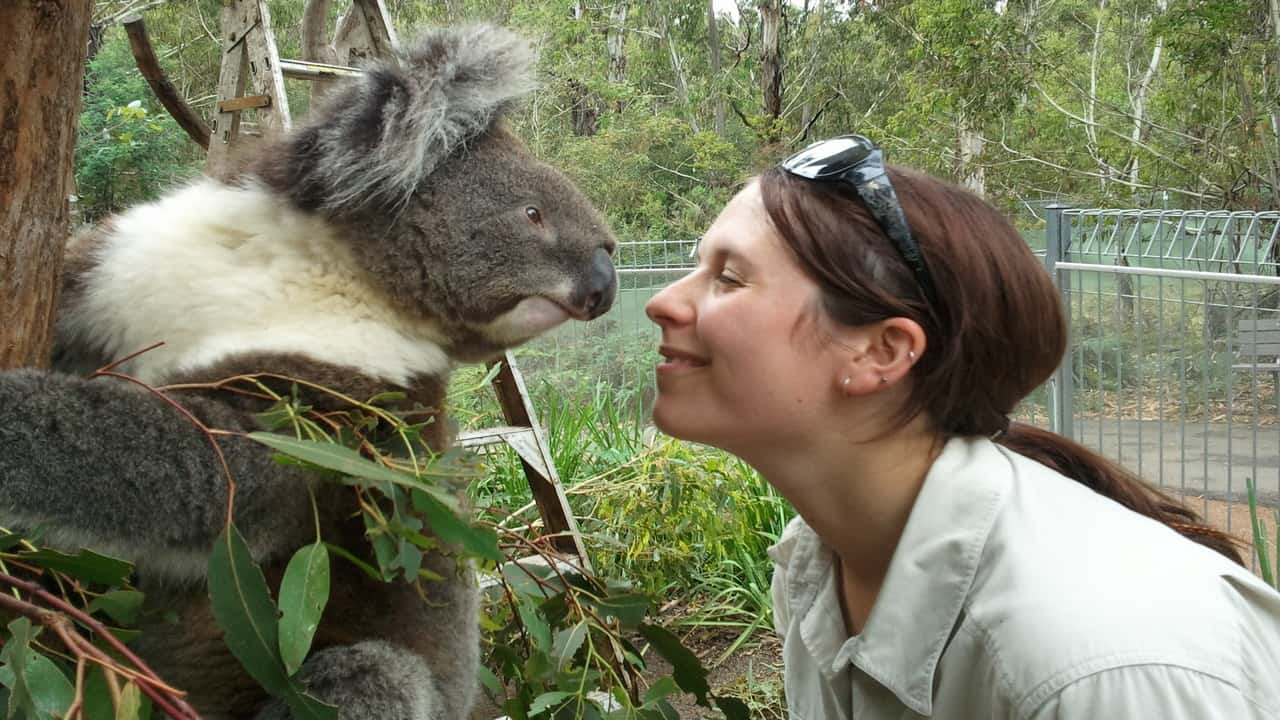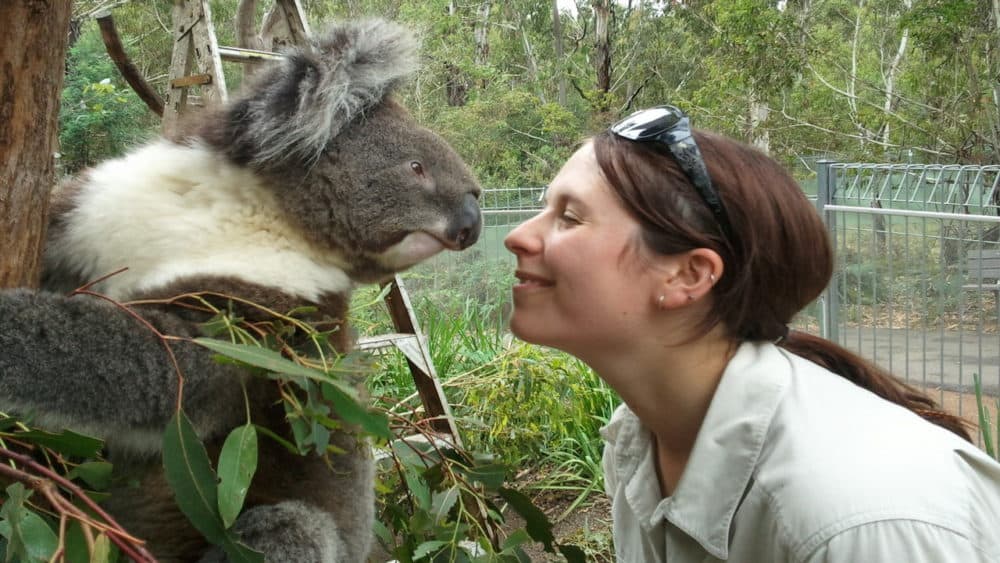October 2019 KPA CTP of the Month
Jade Fountain, KPA CTP, has trained a multitude of species, studied with many of the most renowned animal training and behavior professionals across the globe, and traveled extensively to teach, train, and learn about animals and their human handlers. With academic credentials that include a bachelor’s degree in zoology and a master’s degree in animal behavior/zoology, as well as experience in environments as varied as the South African bush, US film sets, conservation areas in Australia, and prison populations, she is a busy and talented KPA CTP leading an extraordinary life.

When she attended her first ClickerExpo conference in 2010, Jade heard about the Karen Pryor Academy Dog Trainer Professional (DTP) program. “I traveled from Australia, not knowing anyone, but came away with a sense of community,” Jade remembers. Her experience at ClickerExpo fueled her passion for learning. Soon after, Jade heard about the KPA DTP World program and was impressed, particularly by “the caliber of mentors who were available as program instructors—familiar and respected names in the industry.”
Jade completed the International format of the KPA program in 2012 in Sequim, Washington, with Terry Ryan as her mentor. Her relationship with Terry continues to this day. “I consider myself fortunate to have Terry’s guidance and friendship, and I continue to learn from her. I am in the process of publishing a paper from my master’s research about a clicker training project involving chickens; Terry is a co-author of the paper.”
What Jade found most positive about the KPA DTP program was the program assessment that required participants to train a species other than a dog. “Some of the greatest lessons in animal training come from stepping outside your comfort zone and extending your skills to work with other animals.” Discovering the perspectives of a range of learners helps trainers understand the needs and motivations of the species in front of them at any given moment, for any project. From there, you “adapt your training skills to meet learners at their levels,” according to Jade. She believes that limiting yourself to just one species can impede skill development. Jade worked with a brolga, a large bird native to Australia; a guinea pig; and horses as part of her “other species” training as she completed the KPA DTP program.

Some of the greatest lessons in animal training come from stepping outside your comfort zone and extending your skills to work with other animals.

“I’ve always wondered why some people think certain species of animals can’t be trained. I have had many mind-blowing moments watching species be trained to respond to the environment and undertake tasks on cue, improving their own wellbeing and aiding people. Having seen animals from bees to sea stars to fish respond to cues and learning, I have wondered how much more training can improve the lives of animals and people. I believe anything is possible.”
Jade’s professional work is wide-ranging, but she says, “I utilize clicker training foundations in every aspect of my life. Whenever I develop a training plan for an animal, there is an element of teaching that uses positive reinforcement.” Explaining that she has “been fortunate to work with animals in a variety of care settings across the world,” Jade believes that “the applications of positive reinforcement are limitless.”
Jade has worked with shelter dogs as well as service dogs; assistance dogs training to help people with autism, mobility issues, and PTSD; detection dogs; and ex-military dogs that need assessment post-assignment. In shelters, Jade has worked with fantastic people who “dedicate their lives to changing the world for each dog or cat that comes into the shelter.” Her focus has been on cases where significant behavior change is needed to build an animal’s skills and increase its trust before it is welcomed into a new home. “It is incredibly rewarding to apply the science of learning to change outcomes for dogs that have a background lacking in social or learning skills and see them transform into sociable, adoptable dogs that can settle into forever homes.” Jade says that using positive reinforcement to teach service dogs the immense variety of tasks that allow the dogs to connect with people and assist them is also very fulfilling.
Jade has worked in the “glamourous” film set space as a studio trainer in the United States, training cats for television work and dogs for films. “I once assisted on a set with a team of seven dogs,” Jade reports. She has also worked in less-than-glamorous conservation-based recovery programs throughout Australia and South Africa. Her conservation efforts have included cheetah conservation programs (training cheetahs and developing behaviour-modification programs), behavioral field research, wildlife rehabilitation, training wildlife-detection dogs to locate critically endangered species, and steps to eliminate poaching. Jade says, “I am passionate about wildlife conservation and working with modern zoos and wildlife parks to maintain animal numbers and raise the awareness of animal needs across the world.” She has worked for the Save the Tasmanian Devil program and with various facilities and breeding and education programs dedicated to increasing animal populations and reintroducing animals back to the wild. In South Africa, Jade lived in the bush with a team involved in wildlife anti-poaching, raising orphaned wildlife, surveying the greater Kruger area, and conducting behavioral observations on wild animals. “There were some memorable moments, such as running on foot from a bull elephant and lions in a territorial dispute in our camp!”
Jade is also passionate about teaching companion animals to be part of their own health care, something she has seen trained well with exotic animals. Her belief is that this training can be applied easily to animals in family homes in order to reduce unnecessary fear and stress. One of the first species Jade trained, other than dogs and cats, was a marsupial called a greater bilby. “I taught bilbies to participate in their own health care and helped increase their confidence around their human caregivers.” Jade has also trained wallabies, emus, Tasmanian devils, sea lions, vultures, cheetahs, and a variety of other land and sea animals to take part in voluntary husbandry and medical care. She trained a family of meerkats, a group of cheetahs, and a brush-tail rock wallaby, all animals that had experienced a breakdown in their relationships with their handlers and become aggressive. “Reigniting trust with the humans that work with these animals, building new behaviors through positive reinforcement, giving the animals choices and teaching them what we want, all the while removing aversive experiences from their daily life, were crucial steps in recovering relationships. All three of the cases had great outcomes!”
Jade’s current project is “using clicker training to teach ambassador animals in several endangered species.” The goal is for these unique ambassadors to help inform the public and raise awareness of the plight of their species in the wild. Another interesting project Jade participated in was training conservation canines to locate critically endangered Riverine rabbits in South Africa for the Endangered Wildlife Trust. She says, “It’s great to collaborate with professional, working canines that utilize clicker training for such important outcomes.”
Training and behavior expertise aid Jade in interpersonal interactions, too. “I utilize TAGteach working with any human client.” One of the most meaningful experiences Jade had with TAGteach was witnessing “how effective TAGteach was when I was coaching prison inmates how to raise and train puppies as part of a puppy prison program. These guys (inmates) had rarely or never experienced reinforcement-based learning or positive feedback in their lives. They admitted that it surprised them and took some getting used to, but it was well received.” Jade enjoyed “the challenges of working toward changing the inmates’ lives by upskilling them while simultaneously delivering a solid learning program for growing pups to develop into working service dogs.” The inmates turned into enthusiastic trainers and the bonds with the dogs they trained changed their social interactions.
Jade uses clicker training foundations in every aspect of her life, “wherever I can find an application for it.” She employs positive reinforcement teaching or interacting with clients, friends, family, and colleagues. Jade explains, “I have met a lot of incredible people in the industry, and I have grown as an advocate for animal behavior welfare using positive reinforcement. From communicating to people just what they can achieve with animals in their homes to helping researchers or kennel hands/zookeepers understand that they can connect with and achieve results from an animal that enjoys participating in tasks to helping a shelter volunteer arrive at a new sense of confidence in searching for behavior they want from an animal—all areas of human-animal interaction can be impacted positively by skilled training.”
Jade’s degrees are in zoology/psychology, with a specialization in personality and behavior. How animals experience and perceive the world and the function of their behavior has always interested her, spurring her research into topics like cognition and the study of animals’ minds, intelligence, and emotional experiences. “The fields of applied behavior analysis, learning theory, ethology, cognition, and neuroscience don’t always overlap or align perfectly, but I’ve always been keen to see an integrated approach, employing all of these fields, applied to teaching animals and changing behavior,” Jade states. “I believe they are all important.”
Jade’s recently completed research toward her master’s degree in zoology/animal behavior looked at reward pathways in operant learning. Specifically, she researched “how learning is affected if we temporarily block the ability to enjoy a reward.” Jade reports that, “maybe not surprisingly, learning rates drop to zero and behavior cannot be reinforced in those circumstances.” Sharing just a bit more of her research, Jade declares that “clicker training 50 hens a day was a good challenge!”
Taking her own education and experience on the road, Jade has been offering seminars and workshops to the public and industry for several years. “I really enjoy passing on knowledge and building skills in others so that they can apply reinforcement programs to improve animal care.” Her work with staff and volunteers at the RSPCA, service dog organizations, and at universities “has been hugely rewarding” for Jade. “Coaching others to train animals and seeing satisfaction among teachers and learners is the part I enjoy.” Jade also shares training information and science-based research through her business, Animal Behaviour Matters, and via Facebook and other social media platforms.
As she enjoys learning and values up-to-date knowledge about the industry, Jade is always seeking out learning opportunities through workshops, seminars, and conferences. “I’ve attended more than ten chicken camps to date, and I highly recommend all of the classes at The Ranch!”
Jade has plans to keep learning, but her firm belief and established philosophy can be expressed this way: “It doesn’t matter where you are in the world, your ability to change behavior is always useful in helping people’s and animals’ lives.”

